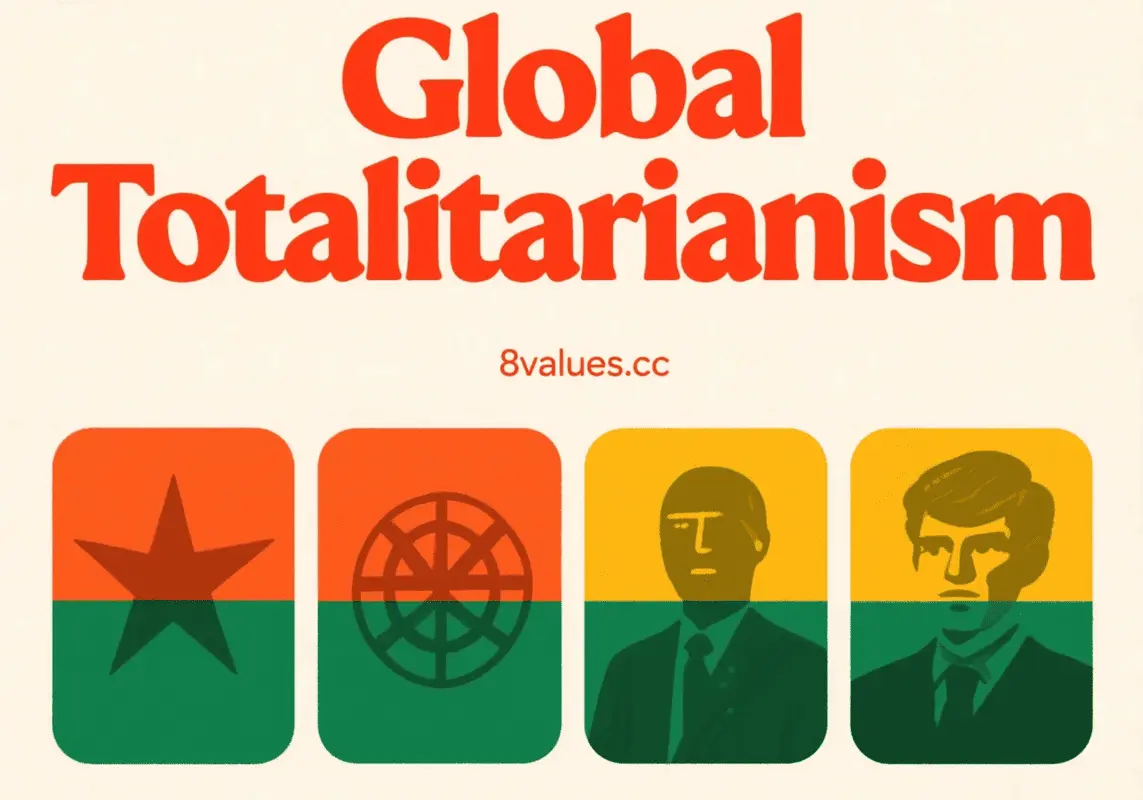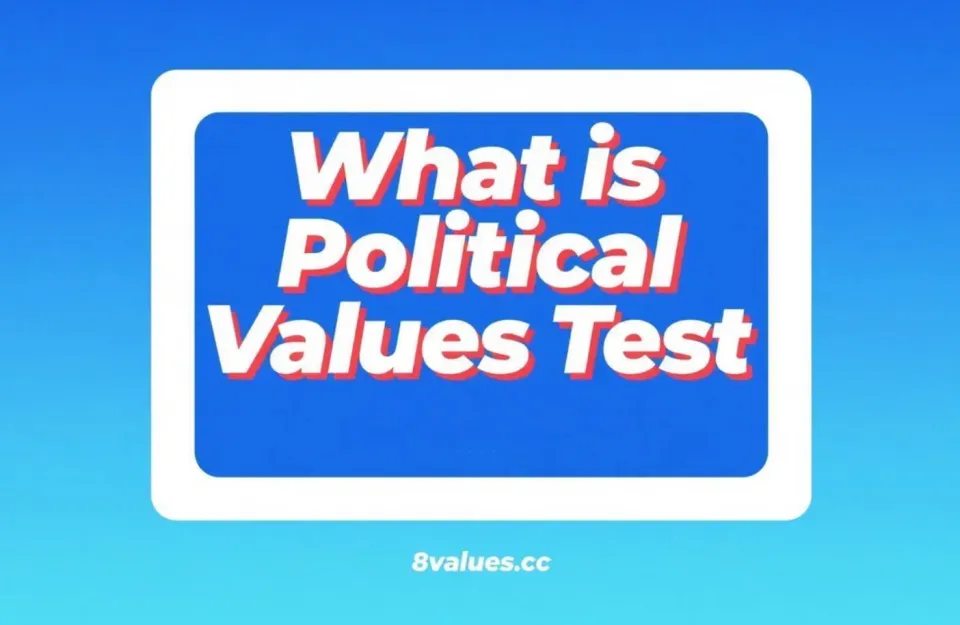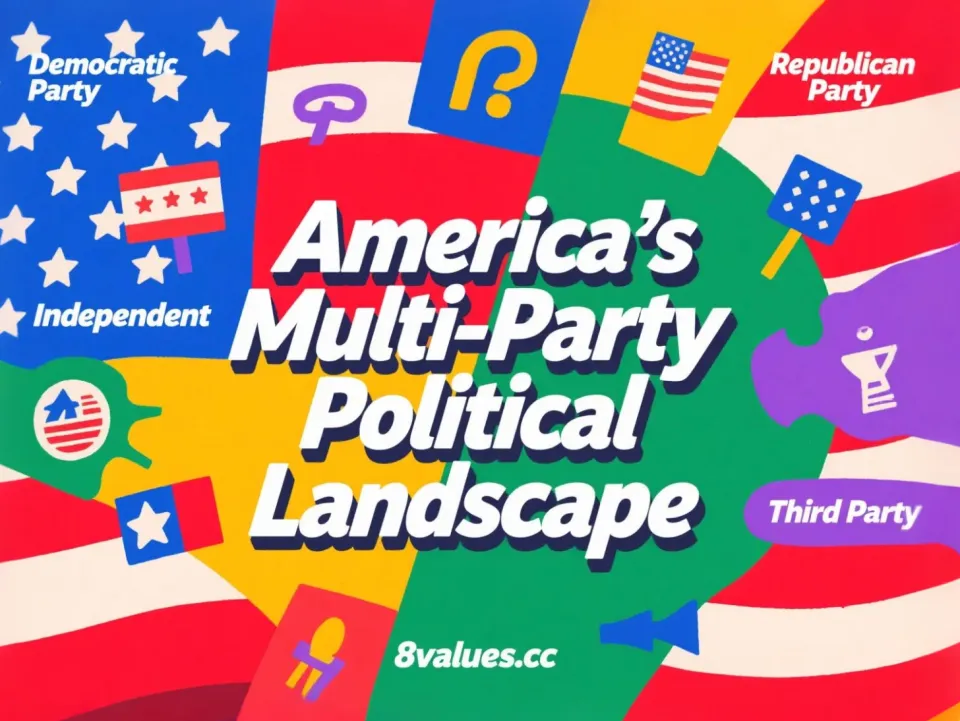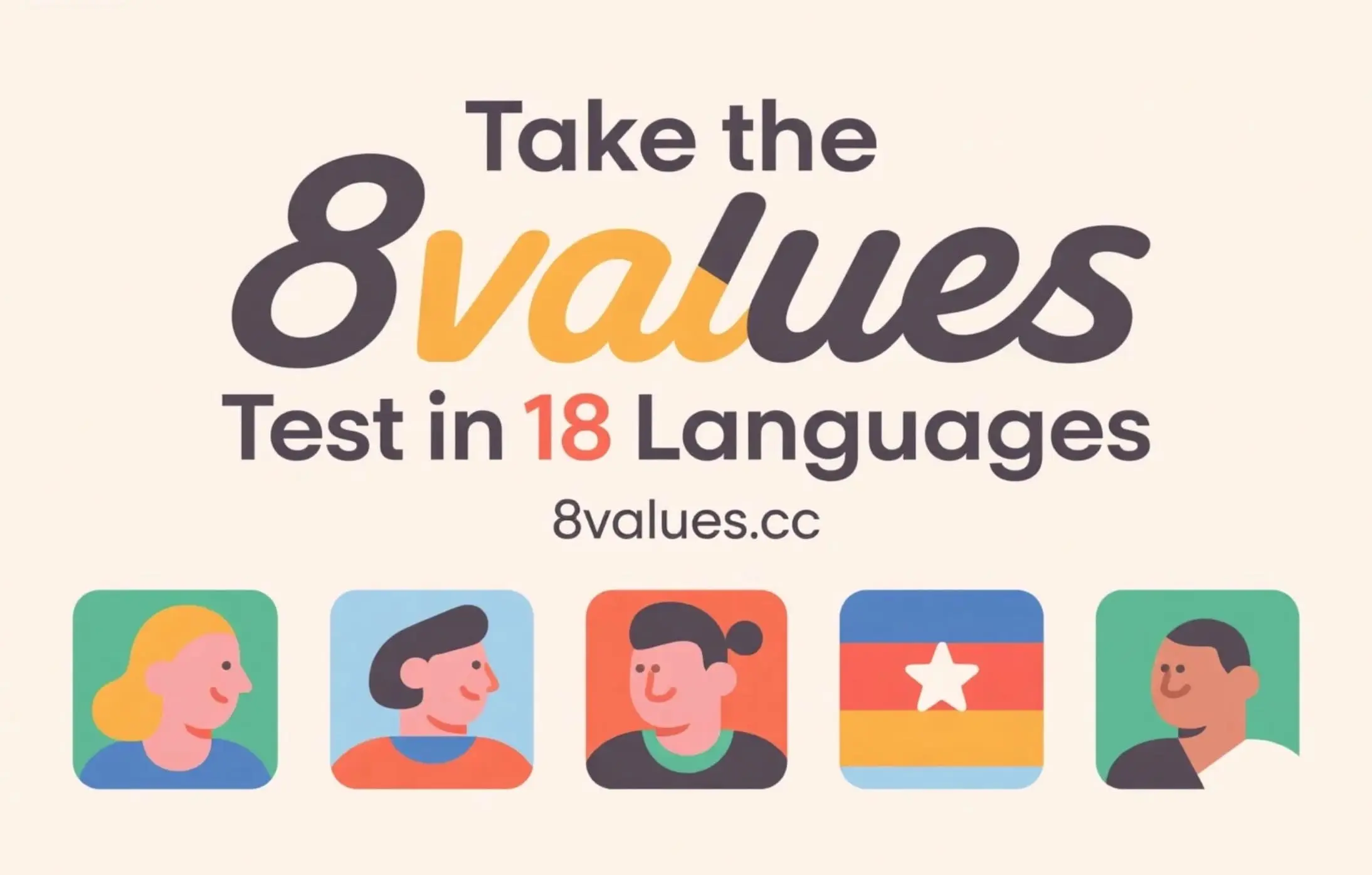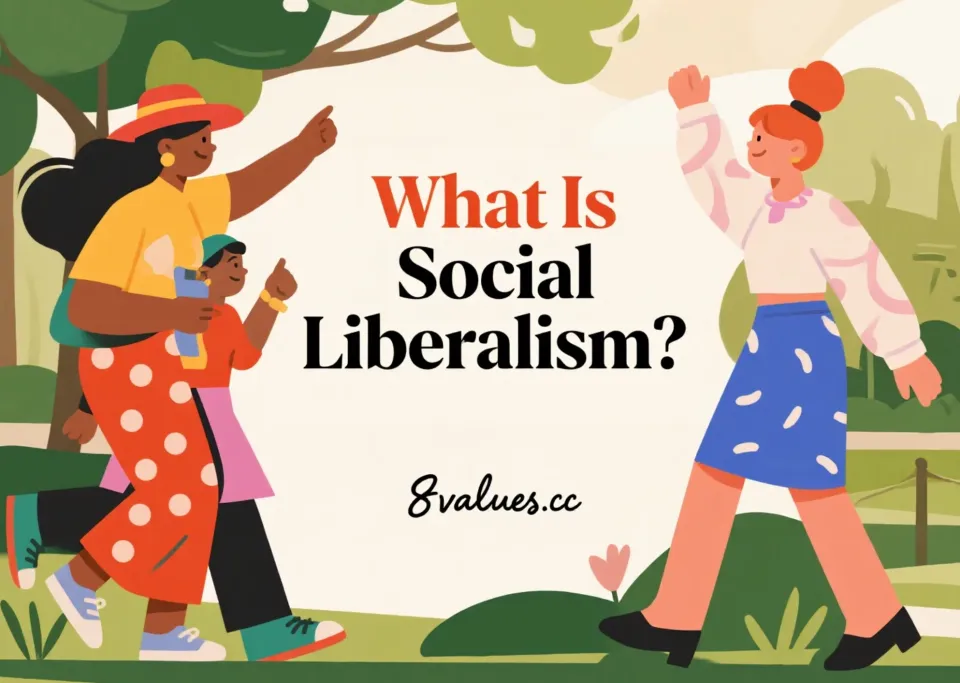Global Totalitarianism | 8values Interpretation of ideological ideology in political tests
This article will explain in detail the definition, core characteristics of the ideology of "global totalitarianism" in the political test of 8 values, the difference from national totalitarianism, and the potential risks and disputes in the current context of globalization and technological development. Understanding this theoretical concept of the combination of extreme centralization and globalization will help you better understand the political spectrum and personal stance.
Have you ever measured the unique ideological result of "Global Totalitarianism" in this website's 8values political test ? This name is not a common term in everyday political discourse, but it represents a political stance that combines extreme centralization with a globalist vision. This article will provide an in-depth, comprehensive and easy-to-understand interpretation of this concept to help you understand its essence, characteristics, and the thoughts it may trigger in today's world.
"Global totalitarianism" is a highly hypothetical ideological label in the 8 values test, aiming to describe a position that supports the control of all countries and nations through a single global centralized system. Unlike totalitarianism, which traditionally concentrates power on a single nation or state, global totalitarianism transcends state boundaries and pursues comprehensive control over the affairs of all mankind.
What is "global totalitarianism"?
"Global totalitarianism" refers to an ideology that advocates the control of all countries and nations through a single global centralized system. It is not a simple centralization within the country, but seeks to achieve absolute authoritarianism and overall control over all public and private lives on a global scale.
Global totalitarianism is reflected in the 8 values ideological test as a political tendency to have both high "authority" and high "globe" scores. It depicts a global society dominated by a single, all-inclusive authority, where all individuals and states must obey their rules and values. Although a complete practical system has not been formed yet, some policy trends and theoretical discussions have shown their potential risks.
If you are interested in your specific location on the political spectrum , or want to learn more about the ideology types in the 8values test, you can visit the corresponding page of the website.
The core characteristics of "global totalitarianism"
The vision of “global totalitarianism” is built on several key features that together form a picture of its overall control:
- High centralized power and global central authority : It advocates the establishment of a global authority or "world government" that transcends national sovereignty, and unified management of global political, economic and social affairs in a centralized manner, thereby eliminating the autonomy of nation-states. Such global institutions will have absolute authority and are responsible for global economic distribution, environmental protection, population management and cultural norms. It monopolizes global military, economic and cultural resources and implements indiscriminate domination through technical means.
- Forced cultural homogeneity : with the goal of eliminating cultural differences, suppress local languages, religions and traditions, and force standardized values and social norms. Opposing diversity is its core principle, requiring individuals to unconditionally obey global authority.
- Global monitoring and suppression systems : establish a global monitoring network through advanced technical means (such as artificial intelligence, big data, biometrics, brain-computer interfaces, satellites and drones), and systematically suppress dissent and restrict civil liberties in the name of "maintaining order". This control will penetrate into personal behavior, ideological intervention and even genetic management in order to "optimize humans."
- Global unified allocation of economic resources : abolish national economic autonomy, central authority will uniformly allocate resources, and deprive local development decision-making power. The economy may be planned and managed uniformly by global institutions, emphasizing the “equalities” or efficiency of global resource allocation rather than local or market-driven free competition.
- The forced indoctrination of universal ideology : the forced implementation of a single, all-encompassing official ideology that penetrates into all aspects of life such as education, art, science and the personal morality of citizens. This ideology is regarded as the only truth, requiring active participation and allegiance to all citizens.
- Totally eliminate all opposition voices : Once in power, this regime will ban all political parties and opinions contrary to itself through censorship, secret police, propaganda tools, and through legal or de facto means. It will establish youth organizations, instill national propaganda from a young age, and generally persecut religious beliefs. Resistance will face severe sanctions or repression because there is no shelter "outside the state" to escape.
"Global totalitarianism" and "national totalitarianism": An analysis of core differences
Although "global totalitarianism" and " national totalitarianism " both belong to the category of totalitarianism and both emphasize highly centralized authoritative control, there are significant differences in scope, goals and ideology between the two.
| Dimension | National totalitarianism | Global totalitarianism |
|---|---|---|
| Power Boundaries | Limited to a single nation state or ethnic group | Break through sovereignty and pursue global domination |
| Source of legality | National superiority, nationalism or specific national interests | "Global unified governance" or "Unification of all mankind" |
| Control means | Relying on violent machines and nationalist incitement | Rely on technology monopoly and transnational capital, international alliances or technical governance |
| Geographical scope | Focus on internal control of a single nation or country | Go beyond the nation-state and pursue unified governance on a global scale |
| Ideology | Usually, the cultural and racial superiority of a specific ethnic group is the core | More likely to be named for universal values of globalization (such as equality, sustainable development) |
| External constraints | Facing external threats and internal objections from other sovereign states, there are dissidents "outside the state" | Eliminate the concept of "outside the state", without external constraints, and have global monopoly on legal violence |
| Typical cases | Nazi Germany, Iraq during Saddam's period, etc. | There is no complete corresponding entity, and it is more common in science fiction works or theoretical ideas |
Historical totalitarian regimes, such as the 20th-century Nazi Germany, Italian fascism, and the Soviet Union, can be seen as a stage or predecessor of a wider form of global control.
The historical origins and evolution of totalitarianism: thinking from the country to the world
To understand "global totalitarianism", we first need to review the origin and development of the traditional concept of "totalitarianism".
The definition of totalitarianism and its early application
Totalitarianism is a political system that strives to implement comprehensive control of society, which not only penetrates the public sphere, but also penetrates all aspects of private life. This term was first proposed by Italian fascist leader Benito Mussolini in the 1920s to describe his newly built fascist state, and summarized its essence by his famous saying "There is nothing outside the state, nothing outside the state, nothing outside the state." Initially, this concept had a positive meaning and was used by fascists to promote its vision of providing a “new way of life.”
However, the term was quickly used by critics to describe an absolutely and oppressive single-party government such as Nazi Germany and Stalinist Soviet Union. These regimes are driven by a single, all-inclusive official ideology, often led by a dictatorial leader and shape and mobilize the people through systematic political oppression, state-controlled media propaganda, and suppression of traditional social institutions.
The difference between totalitarianism and authoritarianism
In political science, it is crucial to distinguish between totalitarianism and authoritarianism, and although both concentrate power and limit civil liberties, their differences are in the degree of control and intention.
| feature | Authoritarianism | Totalitarianism |
|---|---|---|
| Control range | Only for political spheres, it may allow civil society to have some autonomous space | Enhance the overall control of public and private life |
| Ideology | Lack of a unified and transformative ideology, and pay more attention to maintaining the status quo | Driven by an official, all-inclusive ideology aimed at revolutionizing society |
| Public Mobilization | Requesting public to remain passive politically and suppress anti-government activities | Requesting active participation and allegiance to the regime and its ideology |
| Treat civil society | Tolerate some traditional or special interests organizations | Suppress all traditional social organizations to eliminate competitive loyalty to the national ideology |
| Leader Charm | Usually lower | Usually higher |
In short, totalitarianism is an extreme form of authoritarianism, which attempts to achieve "complete domination" through comprehensive infiltration and transformation.
Views and historical cases of famous scholars
Many scholars have conducted in-depth research on totalitarianism:
- Hannah Arendt sees it as a whole new political phenomenon, unlike traditional autocracy, emphasizing that he uses concentration camps and extermination camps to verify the belief that "everything is possible." She believes that Italian fascism was not truly close to totalitarianism until 1938, and its failure to completely eliminate the influence of the Catholic Church and the fact that Mussolini was deposed by the king showed its "imperfection".
- Carl Popper traces the roots of totalitarianism to the philosophical thoughts of Plato in ancient Greece and criticizes Hegel and Marx's historical determinism, believing that it may lead to a closed totalitarian society.
- Friedrich and Brzezinski proposed six key characteristics of totalitarianism: detailed guidance on ideology, single party state, state terrorism, weapons monopoly, mass media monopoly, and centrally planned economy.
Historical cases, including Nazi Germany, are regarded by scholars as typical representatives of totalitarianism.
Technology as a driving force: Digital Path to Global Totalitarian Control
The development of modern technology provides unprecedented tools and possibilities for the idea of "global totalitarianism". As Bertrand Russell said, modern technology has brought the intensity of government control to a new level and has been fully utilized by totalitarian states.
- Comprehensive monitoring network : technologies such as artificial intelligence, big data analysis, biometrics, brain-computer interfaces and global positioning systems can build a real-time global monitoring network, track individual actions, analyze and predict citizens' "potential risks", and use them for political censorship.
- Ideology and information control : Use algorithms to push customized information flow, combine network censorship and AI filtering technology to automatically block "sensitive information" to achieve a systematic reshaping of group cognition. This technology allows the country to monopolize all mass media, broadcast the official "truth", and shape public opinion.
- Cross-border data sharing and technology output : Totalitarian countries may establish cross-border data supervision mechanisms with their allies, expand the scope of monitoring to overseas activities (such as international students and overseas citizens), and sell monitoring technologies such as facial recognition and public opinion analysis systems to other countries, thereby promoting global privacy erosion.
These technological advances have enabled state power to touch every individual and every corner of society with unprecedented strength, diffuse and permeability.
What is “Global Totalitarianism” in the 8 values test: Interpreting your score
In the 8 values political ideology test , “global totalitarianism” is a hypothetical ideological label generated through a specific mechanism. It reflects the strong tendency of users in the following two core dimensions:
- Civic Axis strongly tends to be Authority : This means that users support strong state power and advocate that the state deeply interfere in personal life, implement government monitoring and even censorship systems to achieve social order and control. This tendency is not only a preference for power rule, but also a desire to comprehensively regulate and control all aspects of life.
- Diplomatic Axis strongly tends to be "globe" : This means that users have cosmopolitan and globalist tendencies, emphasizing peaceful diplomacy, international cooperation and integration, and even supporting the establishment of a "world government".
When users get high scores on both axes at the same time, the test results are classified as "global totalitarianism." In addition, this position may tend to be "planned economy" or "equality" on the economic axis to support the centralized management of global resource allocation; on the social axis , it may tend to be "progressive" or "unification" on the social axis to support globalized cultural or social norms.
This result suggests that testers tend to support a global, powerful central authority to address global issues (such as climate change, global inequality, or international conflict), but this tendency may come at the expense of personal freedom and local sovereignty.
For more detailed interpretations of the 52 ideologies, please refer to the 8values Ideology page or visit the 8values Quiz blog for more analysis.
Challenges and Criticisms Facing “Global Totalitarianism”: The Dilemma of Utopia
Although “global totalitarianism” may theoretically promise to solve global challenges, it also faces enormous practical challenges and profound ethical critiques.
- Practical Infeasibility : The logistical challenge of forcing a single, unchanging ideology in a world with billions of people, cultures, languages and beliefs is almost insurmountable. Historical experience shows that even traditional totalitarian regimes have never fully realized their idea of "full control", and their so-called "integrity" often faces huge challenges due to complexity and diversity.
- Loss of Ethics and Freedom : Establishing a global totalitarian state will mean erasing all personal freedoms and cultural diversity and replacing it with a single, compulsory ideology. This will be a stifle of human experience and run counter to international conventions such as the United Nations Declaration on Cultural Diversity.
- Risks of abuse of power : Extreme concentration of global central authority can lead to unprecedented abuse of power, corruption and oppression, and lack of effective checks and balances. As philosopher Nasim Taleb pointed out, large, centralized systems often collapse on a large scale, and when failure occurs within a centralized global framework, their impact will no longer be isolated but will have a ripple effect.
- The crisis of legitimacy and the myth of "top-down wisdom" : Global totalitarianism lacking a democratic foundation is easily criticized as a "conflict between civilization and barbarism" and may trigger a global resistance movement. It relies on the assumption that a few elite groups can effectively guide all mankind, ignoring the fact that many great innovations and solutions are often bottom-up.
- Technical ethical dilemma : Global surveillance systems may erode privacy rights in the name of counter-terrorism or environmental protection, making international conventions such as the General Data Protection Regulations useless. Technology hegemony may evolve into a digital colonization of technologically strong countries against weak countries, controlling the economic lifeline of other countries through algorithms.
Realistic mapping and warning of "global totalitarianism"
Although "global totalitarianism" as a complete entity has not yet emerged in reality, some historical and contemporary phenomena may be considered to have similar characteristics and raise concerns about the future direction:
- The expansion of supranational organizations : Some international organizations, such as the United Nations, the EU or the World Economic Forum, may be regarded as the prototype of global totalitarianism in some theoretical interpretations when they try to formulate global rules or interfere with national sovereignty. For example, the World Economic Forum and many global leaders continue to discuss the need for a “Great Reset”, which has been interpreted by some as a “redemption” scheme that may lead to the limitation of individual freedom.
- Global technical monitoring and data hegemony : Globalized Internet platforms, data collection systems, artificial intelligence monitoring and the transnationalization of social credit systems may all be used by global totalitarianism as a tool to achieve its control. The over-expanding international interventionism and globalization of data monitoring under technological hegemony have been pointed out as potential risks.
- Ideological export and geopolitical conflict : Totalitarian states may interfere in other countries' internal affairs in the name of "counter-terrorism" or "national security", exacerbating geopolitical tensions. Challenge the existing international order and promote "new rules" based on power.
- Potential Threats to Personal Freedom : Concerns about the growing totalitarian tendencies in the United States have increased between 2020-22. For example, during the COVID-19 pandemic, governments have imposed extensive restrictions on individual freedom on the grounds of "public safety", including freedom of assembly, closure of religious centers and information review.
These trends remind us that we must remain vigilant and avoid decoupling governance globalization from democratic supervision in order to prevent the creation of more hidden oppression mechanisms.
Conclusion: Go beyond labels and think deeply about the future
"Global totalitarianism" is a thought-provoking hypothetical concept in the 8 values test of political leanings that combines the total desire for totalitarian control with the universal vision of globalism. It depicts an absolutely unified and far-reaching global control system, a future with no "outside the state" to escape.
By deeply analyzing its definition, core characteristics, differences from national totalitarianism, and the enormous practical and ethical challenges it faces, we recognize that this ideology is not only difficult to achieve in reality, but is essentially anti-human adaptability and resilience, which can lead to self-destruction.
The real value of understanding "global totalitarianism" lies in the fact that it guides us to think critically and examine the complex relationship between power, freedom and governance. In an increasingly connected world, we must be wary of any form of excessive centralization, both at the national and global levels, and actively defend individual freedom, cultural diversity and local autonomy. Ultimately, whether the United States will move towards totalitarianism depends largely on whether we resist these trends.
If you are interested in interpretations of other political ideologies, or want to know your political spectrum coordinates in the 8values test, please continue to explore the 8values Quiz website to broaden your understanding of the political world.
